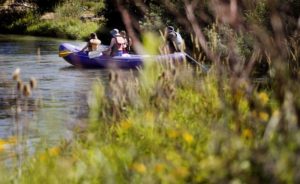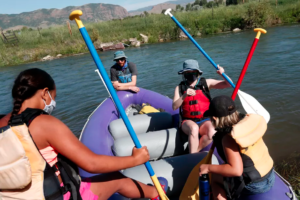The odds of pulling off a traditional sleep-away camp seemed slim even months ahead of summer. S’mores, swimming trips and singalongs don’t usually fit the confines of social distancing.
But several children had already signed up for a new sleep-away program just for kids who have survived abuse or have seen it happen in their homes. So Camp HOPE America organizers in Utah found another way to help the kids have some fun and work on their confidence in the program’s first year: a series of day trips with activities like horseback riding, river rafting and fishing.
The virus had already put on hold other sorts of fun, shuttering schools and canceling play dates, noted Julianna Potter, the program manager for the Utah camp.
“I just really didn’t want this to be just one more big disappointment for them,” Potter said as she rode in a bus to the Weber River with volunteers, a handful of campers in masks and a healthy supply of hand sanitizer. “We just tried to think really creatively and think, ‘Is there a way to do this where we can make it both fun and safe?’”
In light of coronavirus outbreaks, versions of the same summer program across the country have either moved online or called off the camp until next year. Just a handful have found ways to still host activities, Potter said.
Fifteen children ages 8-12 are participating, and Potter hopes to grow the number to 60 next year. It’s the first time the camp has been held in the Beehive State after the Salt Lake County District Attorney’s Office secured $500,000 in grants to host it.
Photo Credit: Laura Seitz, Deseret News
Groups of five children at a time have taken a handful of different half-day trips, sitting several seats apart on bus rides before perfecting their archery skills, taking turns at the front of a raft as it navigated rapids on the Weber, or paddling in canoes, kayaks and paddleboards at Jordanelle Reservoir.
“They’ve had the chance to try these new things and feel success and I think that’s been good for all of them,” Potter said. “Our goal is to kind of give them that power back.”
Several of the youngsters were reluctant to climb atop horses and hit the trail. Some gripped saddles in terror at first. But by the end of the ride, many were sitting tall and smiling, Potter said.
One in that group was 9-year-old Nayt, a Salt Lake Valley boy who hasn’t stopped talking about his horse for the day, Katie, in the month since he sat in the saddle.
“I went down the trail and the mountain,” Nayt said. “It’s really fun and challenging. You can face your fears.”
Nayt, naturally quiet, became more anxious and withdrawn last year after a teenager who lived nearby abused him. The teen boy was later found guilty following a trial in the juvenile system.
The guilty verdict provided a measure of justice, but it did not undo the trauma the young boy experienced, said his mother, Lyndsay. She asked that their last name be withheld to protect her son’s identity.
After a few days at camp, she noticed her son trying new foods, coming up with games for the family to play and speaking up more, all displays of his growing confidence.
“When you start to feel good inside and you start to love yourself, I think that magic happens,” Lyndsay said.
She attributes the growth largely to the camp and to support from the Salt Lake County prosecutors who advocated for her son and the police officers on the case.
Photo Credit: Laura Seitz, Deseret News
The Utah camp, held in coordination with San Diego-based nonprofit Alliance for HOPE International, is free for each child, an acknowledgement that families often are stretching to cover therapy and other costs. It is paid for by a collection of grants totaling $500,000, with the bulk coming from the federal Victims of Crime Act.
Salt Lake County District Attorney Sim Gill said the camp is part of a larger effort to strengthen services for victims, especially for children. The camp allows them to make new, fond memories with support from volunteers and employees trained in how to help survivors of abuse, he said.
“Their lives should not be controlled by these bad memories that they have,” Gill said. “We just wanted to give them an opportunity for the kids to be kids.”
Gill said his office is considering holding similar programs for entire families.
Original Article by Annie Knox from Deseret News

